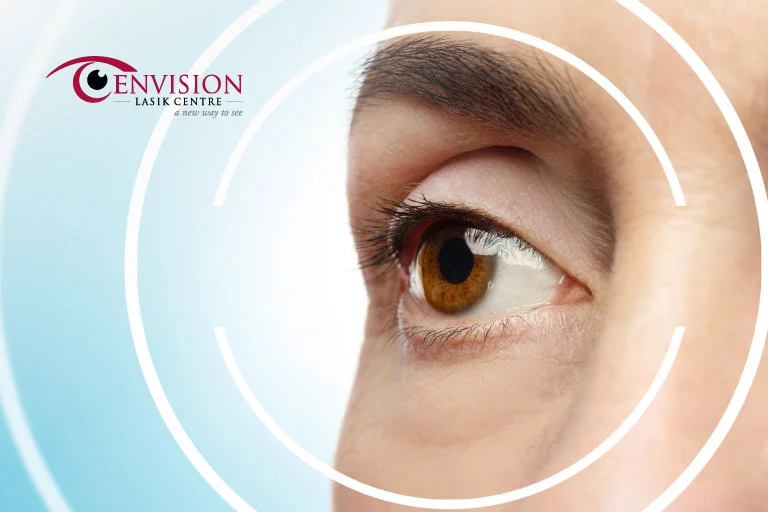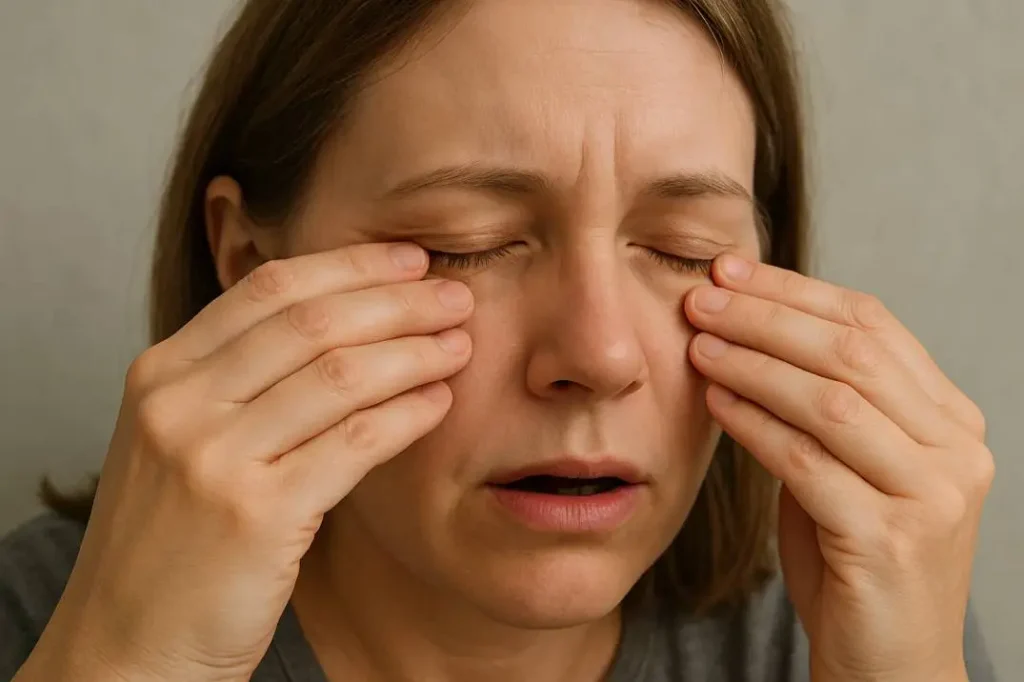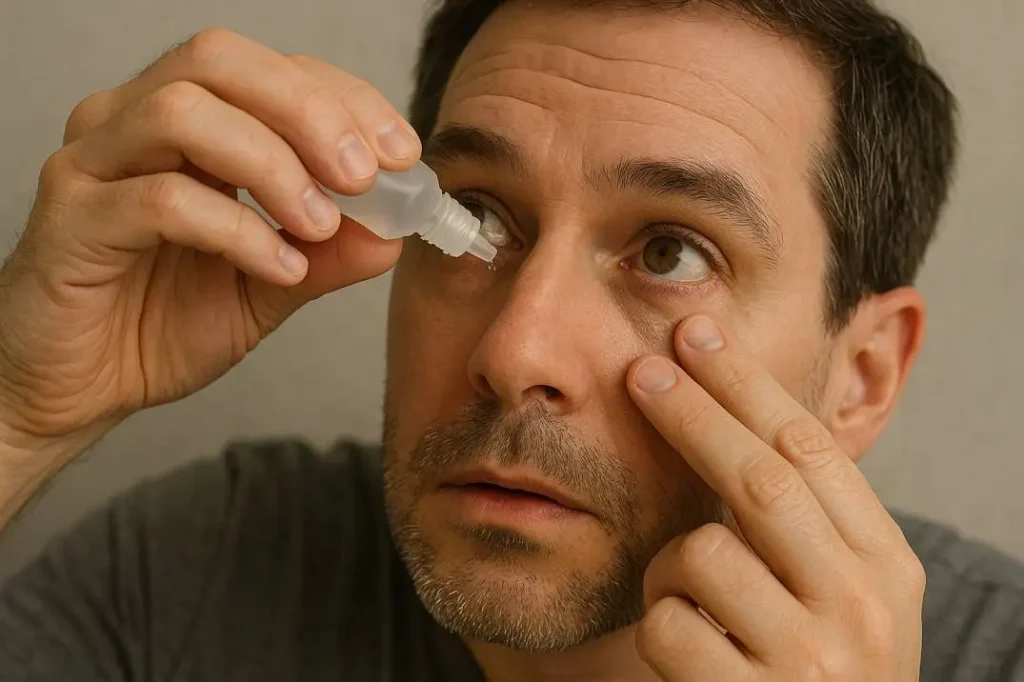Dry eyes after LASIK are very common and usually temporary.
For most patients, dryness is noticeable for the first 3 to 6 months after surgery as the corneal nerves heal and tear production gradually returns to normal.
In mild cases, symptoms like dryness, burning, or a gritty sensation may improve within a few weeks. However, in some people—especially those who had dry eyes before LASIK—symptoms can last up to 9–12 months.
Using preservative-free artificial tears, following your doctor’s eye drop schedule, and avoiding excessive screen time can significantly speed up recovery.
Persistent dryness beyond a year is uncommon and should be evaluated by an eye specialist for targeted treatment.
2.Can LASIK cause dry eye years later?
LASIK usually does not cause new dry eye problems years later in most people. The dryness seen after LASIK is mainly due to temporary disturbance of corneal nerves and typically improves within a few months as the nerves heal.
However, in a small number of patients, especially those who already had borderline dry eyes, autoimmune conditions, heavy screen use, or hormonal changes (aging, menopause), dry eye symptoms can reappear or feel worse years later. In these cases, LASIK is not the direct cause, but it may make the eyes slightly more sensitive to dryness triggers.
If dry eye symptoms appear years after LASIK, they are usually related to natural aging, lifestyle factors, or underlying dry eye disease, and can be effectively managed with proper eye care and treatment.
3.What percent of people have dry eyes issues after LASIK?
Dry eyes are one of the most common temporary side effects after LASIK. Studies show that about 60–70% of patients experience some degree of dry eye symptoms in the first few weeks after surgery.
The good news is that for most people, these symptoms improve steadily. By 3–6 months, the percentage drops significantly, and only around 10–20% may still notice mild dryness. Long-term or persistent dry eye lasting beyond a year occurs in a small minority—roughly 2–5% of patients.
With proper pre-LASIK screening, modern laser techniques, and regular use of prescribed eye drops, the risk of long-term dry eye is quite low.
4.What is the incidence of dry eye after LASIK for myopia, and what are the main risk factors?
Dry eye is a common temporary side effect after LASIK done for myopia (nearsightedness). The incidence is highest in the early recovery phase, with around 60–70% of myopic LASIK patients experiencing dryness, burning, or foreign-body sensation in the first few weeks.
This happens because LASIK temporarily affects the corneal nerves that control tear production. For most patients, symptoms improve within 3–6 months, and long-term dry eye beyond one year is seen in only a small percentage (about 2–5%).
Key risk factors for dry eye after myopic LASIK include:
Pre-existing dry eye (even mild or undiagnosed)
Higher myopia, which requires deeper corneal ablation
Female gender, especially with hormonal changes
Excessive screen time and reduced blinking
Contact lens overuse before surgery
Environmental factors like air conditioning, pollution, or dry climate
With proper pre-surgery screening, advanced laser technology, and good post-LASIK care, the risk and severity of dry eye after myopic LASIK can be significantly reduced.
5. How do I know if my dry eye after LASIK is mild or severe?
Mild dry eye usually causes occasional dryness, burning, or irritation that improves with artificial tears. Severe dry eye may cause constant discomfort, pain, redness, light sensitivity, or blurred vision that does not improve with blinking or eye drops. If symptoms interfere with daily life or worsen over time, you should consult your eye doctor.
6. Is dry eye after LASIK a sign that something went wrong?
No. Dry eye after LASIK is a normal part of healing for most patients. It happens because corneal nerves take time to recover. However, if dryness is severe, painful, or getting worse after 3–6 months, it should be evaluated to rule out chronic dry eye disease.
7. Does dry eye after LASIK affect vision permanently?
In most cases, dry eye does not affect long-term vision. Temporary blurring can happen due to an unstable tear film, but vision usually becomes clear once dryness improves. Permanent vision issues due to dry eye are rare and usually preventable with proper treatment.
8. Which LASIK procedure has a lower risk of dry eye?
Newer procedures like SMILE and Femto LASIK may have a slightly lower risk of dry eye compared to traditional LASIK because they preserve more corneal nerves. However, the best procedure depends on your eye condition, not just dry eye risk.
9. Can dry eye delay healing after LASIK?
Answer:
Yes, untreated or severe dry eye can slow surface healing and cause discomfort. This is why eye doctors focus strongly on managing dryness during the first few months after surgery. With proper care, healing usually progresses smoothly.
10. Is LASIK safe if I already have mild dry eye?
Yes, many people with mild dry eye can safely undergo LASIK, but only after proper treatment and stabilization. Your doctor may recommend lubricating drops, omega-3 supplements, or other therapies before surgery to reduce post-LASIK dryness.
11. Why do computer users experience more dry eye after LASIK?
Screen use reduces blinking, which worsens dryness. After LASIK, eyes are already sensitive, so prolonged screen time can intensify symptoms. Taking regular breaks, blinking consciously, and using artificial tears can help significantly.
12. Can dry eye after LASIK be completely prevented?
Dry eye cannot always be fully prevented, but its severity can be greatly reduced with pre-LASIK screening, choosing the right procedure, and following post-operative care instructions properly.
13. Does weather or climate affect dry eye after LASIK?
Yes. Hot, dry weather, air conditioning, pollution, and low humidity can worsen dry eye symptoms—especially in the first few months after LASIK. Using a humidifier and protective eyewear can help.
14. How is dry eye different from eye strain after LASIK?
Dry eye causes burning, gritty feeling, redness, and blurred vision that improves with blinking. Eye strain usually causes tiredness, headache, or discomfort after screen use. Both can coexist, but treatments are different.
15. When should I stop self-treating and see a doctor?
You should see a doctor if dryness:
Persists beyond 6 months
Becomes painful
Causes worsening vision
Does not improve with prescribed drops
Early treatment prevents long-term discomfort.







 Expert Tip: Advanced treatments like Intense Pulsed Light (IPL) therapy have shown promise in alleviating chronic dry eye symptoms.
Expert Tip: Advanced treatments like Intense Pulsed Light (IPL) therapy have shown promise in alleviating chronic dry eye symptoms.